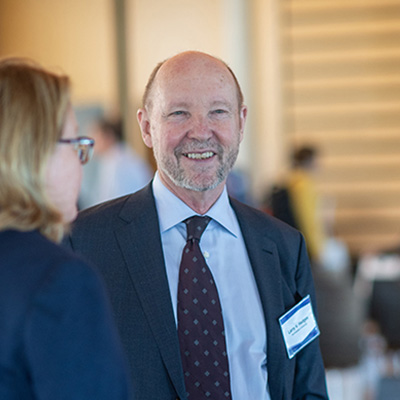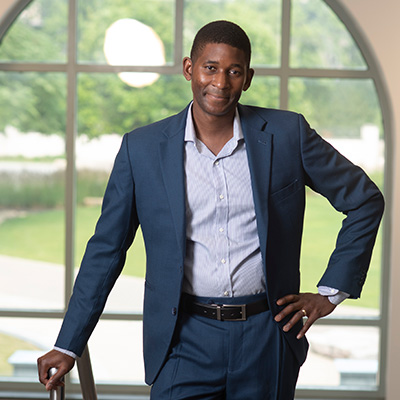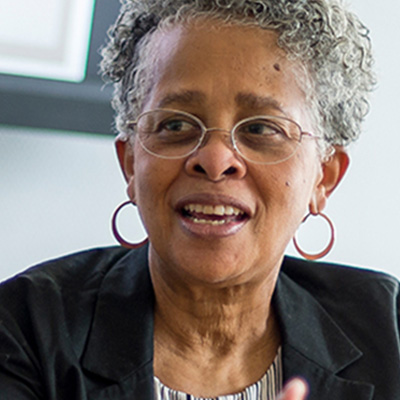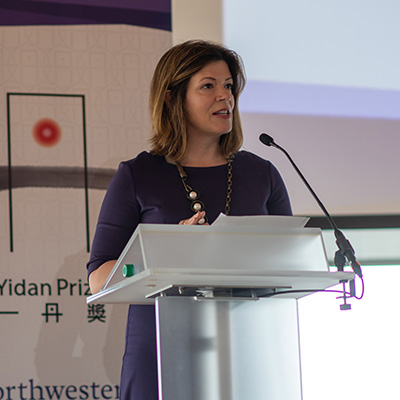Faculty Recognized for Relevant, Useful Research

Five faculty members from Northwestern University’s School of Education and Social Policy were named to the 2024 RHSU Edu-Scholar Public Influence Rankings for their work bringing research out of academic journals and into everyday lives.
Professors Larry Hedges, Kirabo Jackson, Carol Lee, Diane Schanzenbach and James Spillane were among the 200 researchers selected from more than 20,000 university-based scholars in the US. It’s the fifth consecutive year all five have been cited and two of them––Hedges and Spillane––are first generation scholars.
Created by Frederick M. Hess, director of education policy studies for the American Enterprise Institute and an opinion blogger for Education Week, the rankings use eight publicly available metrics: Google Scholar, book points, highest Amazon ranking, syllabus points, and mentions in the education press, on the web, in newspapers, and the Congressional Record.
The final list includes the 150 top finishers from last year, augmented by "at‐large" additions named by a selection committee of 39 accomplished scholars.
Hess admits that the whole endeavor is, “admittedly an imperfect exercise” and the rankings include just a sliver of faculty who are tackling education or education policy issues. The scores tend to favor senior scholars who published a successful book in previous years or a recent big study.
The most popular books, for example, are many of the same ones as previous years. Emily Oster’s 2014 volume Expecting Better: Why the Conventional Pregnancy Wisdom Is Wrong—and What You Really Need to Know was the top performer on the list.
Carol Dweck’s Mindset: The New Psychology of Success (2007) took second place. Other popular titles included: Howard Gardner’s Frames of Mind: The Theory of Multiple Intelligences (2011), Richard Rothstein’s The Color of Law: A Forgotten History of How Our Government Segregated America (2017), Angela Duckworth’s Grit: The Power of Passion and Perseverance (2016), and Gholdy Muhammad’s Unearthing Joy: A Guide to Culturally and Historically Responsive Curriculum and Instruction (2023).
"It’s analogous to rankings of colleges, NFL quarterbacks, or international scorecards of human rights,” Hess wrote. “Such efforts convey real information and help spark useful discussion.”
Read more about SESP’s winners:
 Larry Hedges is best known for developing statistical methods for meta-analysis (a statistical analysis of the results of multiple studies that combines their findings) in the social, medical, and biological sciences. He received the José Vasconcelos World Award of Education from the World Cultural Council in 2023. In 2018, Hedges received the Yidan Prize in Education Research the world’s largest education award. The Board of Trustees Professor of Statistics and Social Policy, Hedges is among the most cited scholars on the list with 134,769 citations throughout his career. His 2021 book Introduction to Meta-Analysis has been referenced 20,974 times, according to Google Scholar. His 2014 book, Statistical Methods for Meta-Analysis has more than 19,000 citations. Hedges has been on the EduScholar list since 2019.
Larry Hedges is best known for developing statistical methods for meta-analysis (a statistical analysis of the results of multiple studies that combines their findings) in the social, medical, and biological sciences. He received the José Vasconcelos World Award of Education from the World Cultural Council in 2023. In 2018, Hedges received the Yidan Prize in Education Research the world’s largest education award. The Board of Trustees Professor of Statistics and Social Policy, Hedges is among the most cited scholars on the list with 134,769 citations throughout his career. His 2021 book Introduction to Meta-Analysis has been referenced 20,974 times, according to Google Scholar. His 2014 book, Statistical Methods for Meta-Analysis has more than 19,000 citations. Hedges has been on the EduScholar list since 2019.
 Kirabo Jackson is the Abraham Harris Professor of Education and Social Policy; he is currently serving on the White House Council of Economic Advisors. A labor economist, Jackson tackles some of the most important and baffling questions in education today, including the impact of school spending, what makes someone a good teacher, and the long-term benefits of learning social emotional skills in high school. His most current research–which is some of his most original and influential–suggests that the most effective teachers don’t necessarily raise test scores. Instead, they help students develop so-called ‘soft skills’ or personality traits. His research on school spending upended the conventional wisdom that school spending doesn’t matter and that standardized test scores are the best way to measure achievement. Instead, he shows that the more money is spent on a child, the better chance they have successful futures. He’s also found that students who can develop social emotional skills go to high school more often and have a higher chance of graduating and successfully attending and staying in college. Jackson has been recognized as an EduScholar since 2016.
Kirabo Jackson is the Abraham Harris Professor of Education and Social Policy; he is currently serving on the White House Council of Economic Advisors. A labor economist, Jackson tackles some of the most important and baffling questions in education today, including the impact of school spending, what makes someone a good teacher, and the long-term benefits of learning social emotional skills in high school. His most current research–which is some of his most original and influential–suggests that the most effective teachers don’t necessarily raise test scores. Instead, they help students develop so-called ‘soft skills’ or personality traits. His research on school spending upended the conventional wisdom that school spending doesn’t matter and that standardized test scores are the best way to measure achievement. Instead, he shows that the more money is spent on a child, the better chance they have successful futures. He’s also found that students who can develop social emotional skills go to high school more often and have a higher chance of graduating and successfully attending and staying in college. Jackson has been recognized as an EduScholar since 2016.
 Carol D. Lee is professor emerita and the former Edwina S. Tarry Professor of Education in the School of Education and Social Policy and in African American Studies. She was recently elected chair of the National Board for Education Sciences and is a member of the National Academy of Education, a fellow of the American Educational Research Association and a member of the American Academy of Arts and Sciences. Lee, who has been an EduScholar for a decade, is widely known for her research that shows the importance of drawing on students’ cultural knowledge to support rigorous learning, and she is the co-founder of four African-centered schools with a 40-year history.
Carol D. Lee is professor emerita and the former Edwina S. Tarry Professor of Education in the School of Education and Social Policy and in African American Studies. She was recently elected chair of the National Board for Education Sciences and is a member of the National Academy of Education, a fellow of the American Educational Research Association and a member of the American Academy of Arts and Sciences. Lee, who has been an EduScholar for a decade, is widely known for her research that shows the importance of drawing on students’ cultural knowledge to support rigorous learning, and she is the co-founder of four African-centered schools with a 40-year history.
 Diane Schanzenbach is an economist who studies policies aimed at improving the lives of children in poverty, including education, health, and income support policies. Her work traces the impact of major public policies such as the Food Stamp Program, school finance reform, and early childhood education on children’s long-term outcomes. Seven of her studies were cited in the 2023 White House’s Economic Advisory Council’s Economic Report to the President, and her research is regularly cited in top media outlets. She has testified before both the Senate and House of Representatives on her research. She is an elected member of the National Academy of Education and the National Academy of Social Insurance. She was first recognized as an EduScholar in 2020.
Diane Schanzenbach is an economist who studies policies aimed at improving the lives of children in poverty, including education, health, and income support policies. Her work traces the impact of major public policies such as the Food Stamp Program, school finance reform, and early childhood education on children’s long-term outcomes. Seven of her studies were cited in the 2023 White House’s Economic Advisory Council’s Economic Report to the President, and her research is regularly cited in top media outlets. She has testified before both the Senate and House of Representatives on her research. She is an elected member of the National Academy of Education and the National Academy of Social Insurance. She was first recognized as an EduScholar in 2020.
 James Spillane, the Spencer T. and Ann W. Olin Professor in Learning and Organizational Change, is one of the world’s top thinkers on school leadership issues, change within organizations, and policy implementation at the state, school, and classroom levels. Known for his collaborative work and ability to bridge disciplines, he explores how leaders build education systems and make instructional decisions. Leadership used to be viewed as top down; teachers were independent contractors, working alone and behind closed doors. Spillane’s work indicates that teachers may benefit from casually bumping into one another in hallways and that school leadership improves when a distributed approach is used. A first-generation high school and college student from rural Ireland, Spillane has been elected to the American Academy of Arts and Sciences and the National Academy of Education. He has been on the EduScholar's list since 2016.
James Spillane, the Spencer T. and Ann W. Olin Professor in Learning and Organizational Change, is one of the world’s top thinkers on school leadership issues, change within organizations, and policy implementation at the state, school, and classroom levels. Known for his collaborative work and ability to bridge disciplines, he explores how leaders build education systems and make instructional decisions. Leadership used to be viewed as top down; teachers were independent contractors, working alone and behind closed doors. Spillane’s work indicates that teachers may benefit from casually bumping into one another in hallways and that school leadership improves when a distributed approach is used. A first-generation high school and college student from rural Ireland, Spillane has been elected to the American Academy of Arts and Sciences and the National Academy of Education. He has been on the EduScholar's list since 2016.